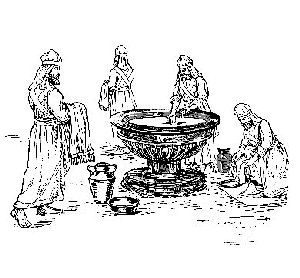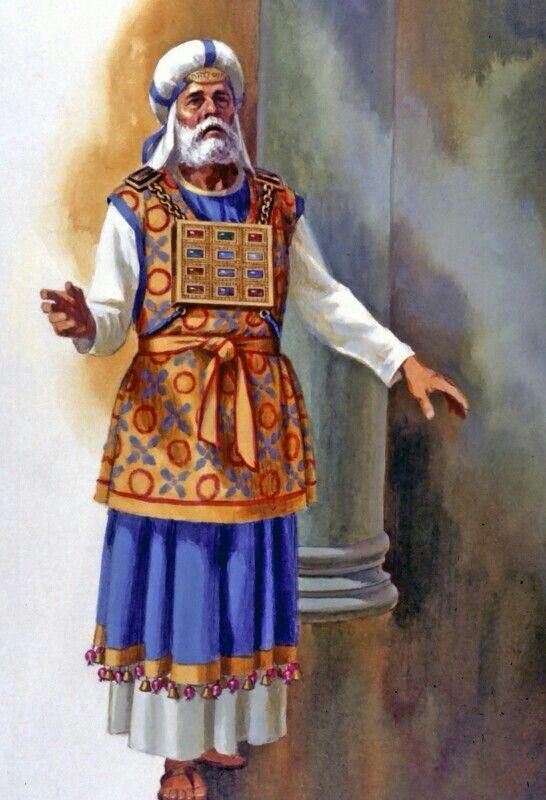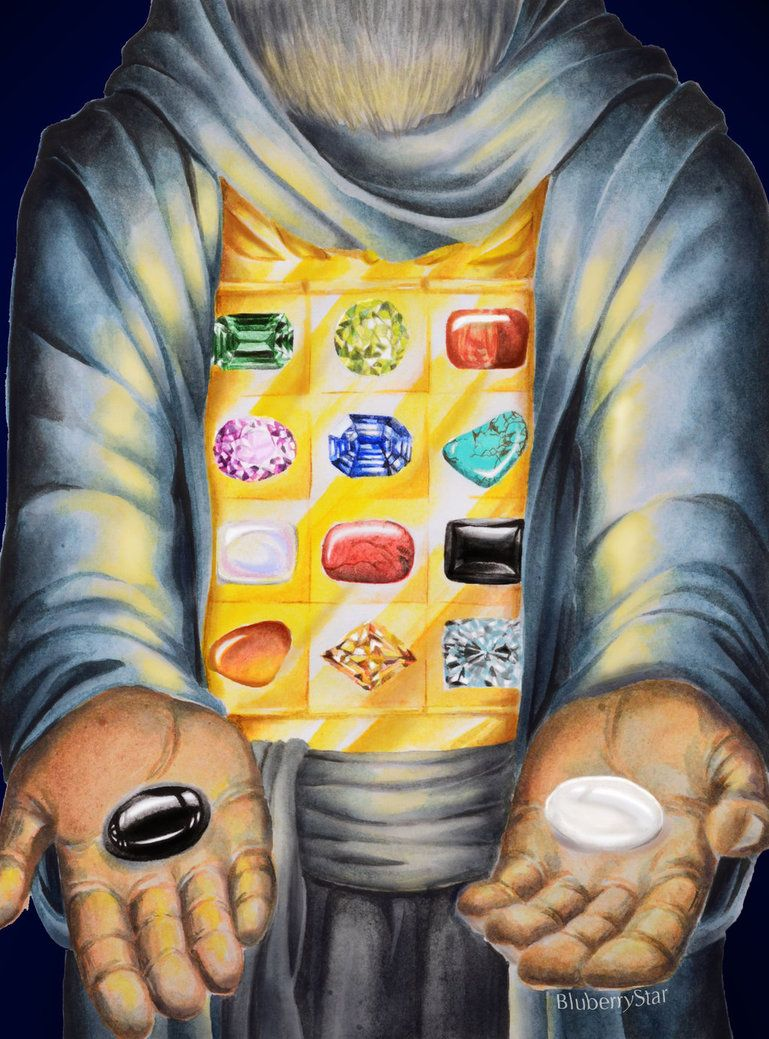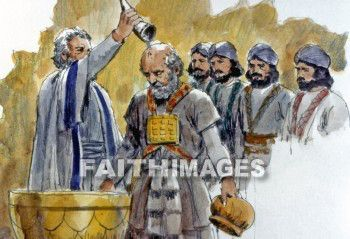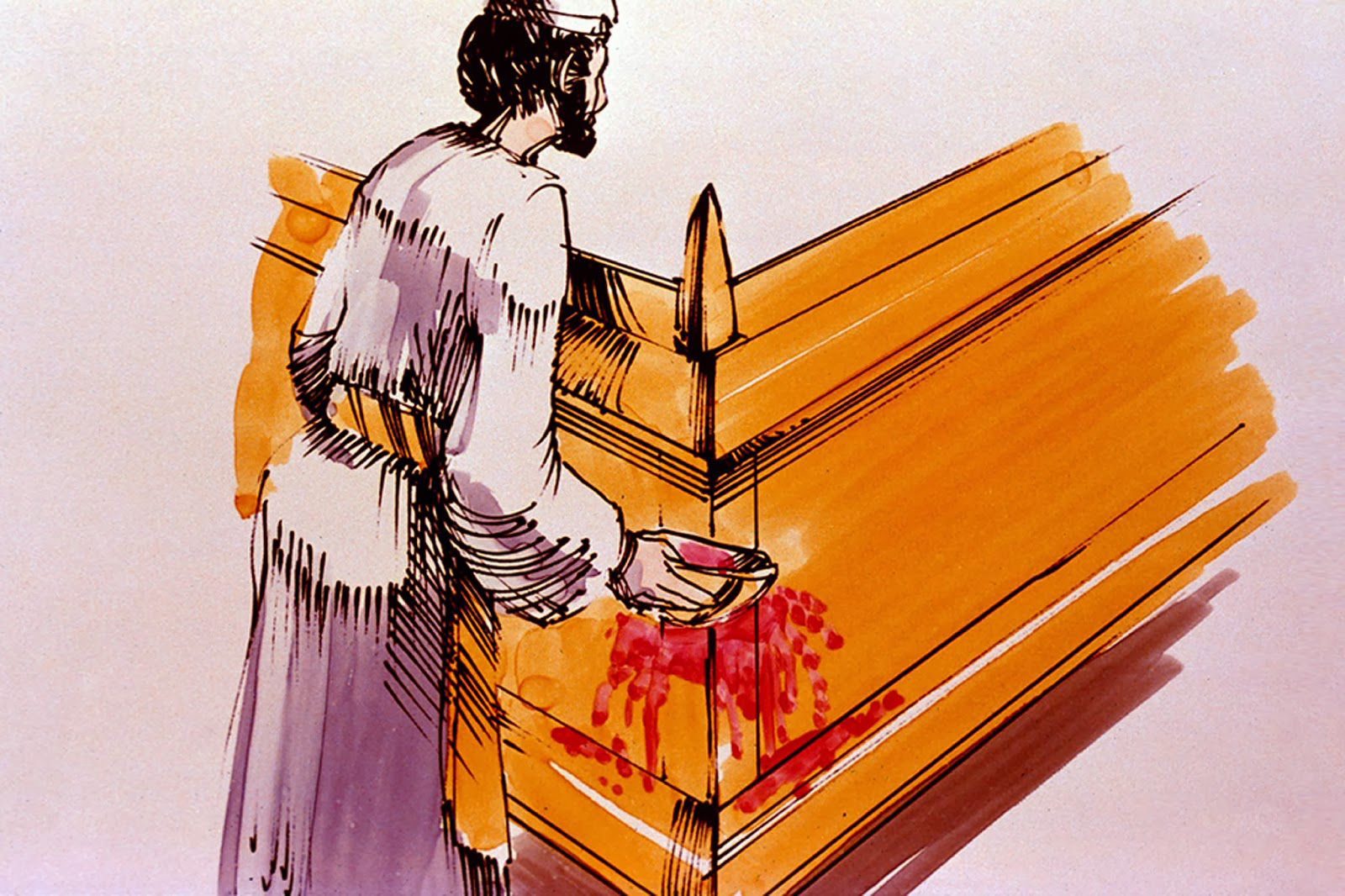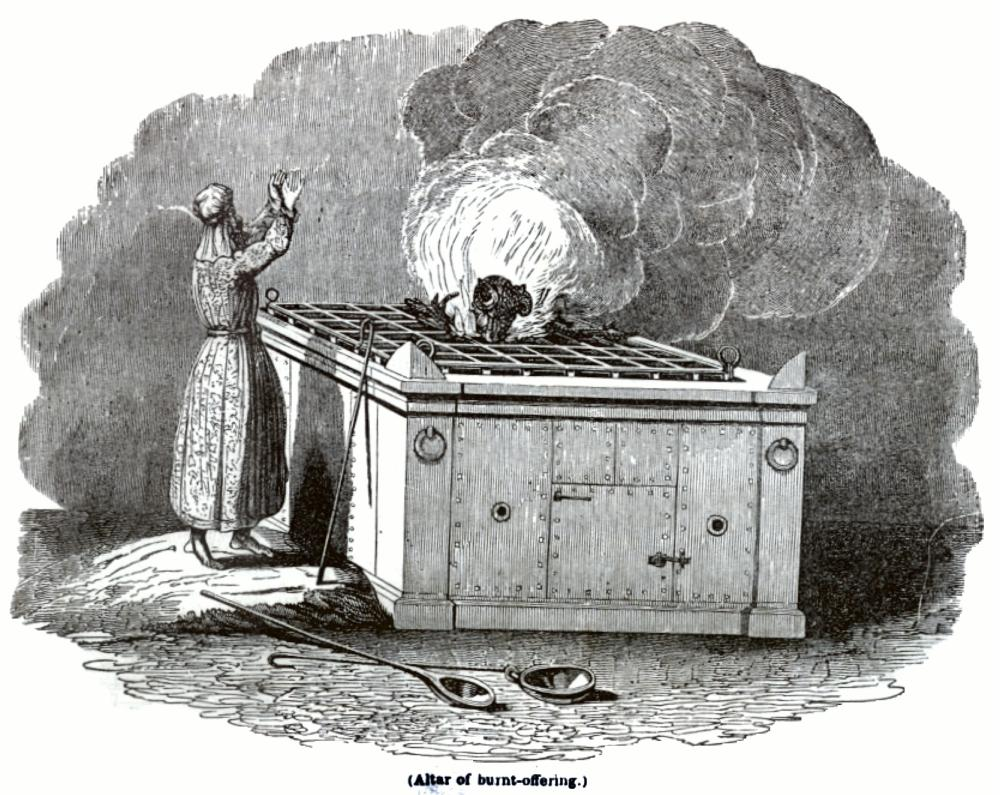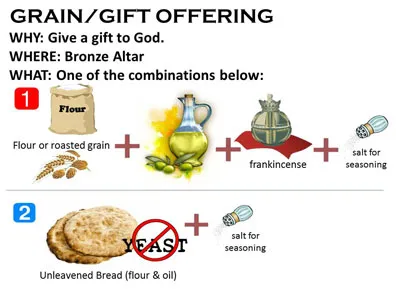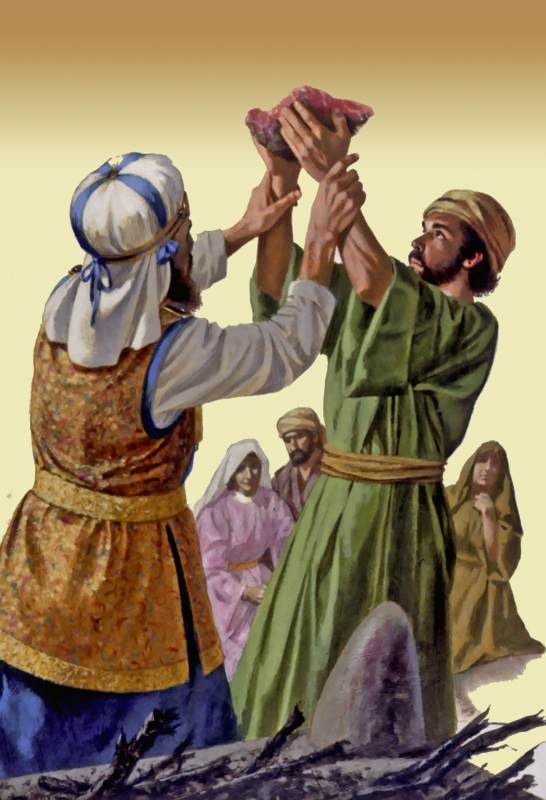Leviticus 8: Lessons from Aaron’s Ordination For Becoming a Priest for Jesus
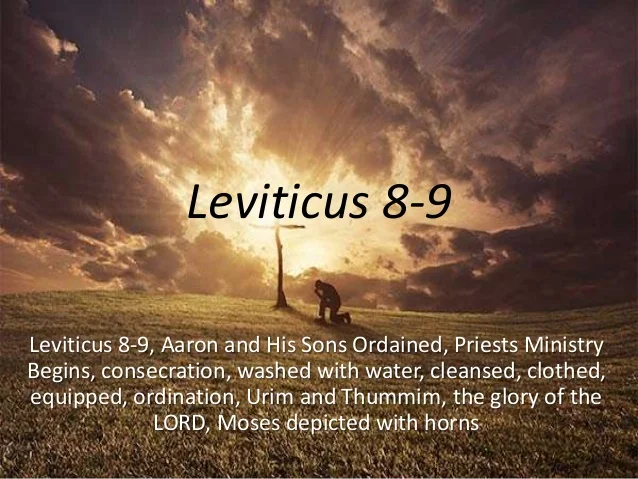
Image credit1
Introduction. The first seven chapters of Leviticus explain the sacrificial laws, which Christ came to fulfill (Heb. 8:4-5; Col. 2:16-17). These same chapters also show how we are to make “spiritual sacrifices” for Him (1 Pet. 2:5). Chapters six and seven then show us how we are to mentor others to help them make their own “spiritual sacrifices” to Christ. In Leviticus Chapter 8, the focus shifts to the procedures that Aaron and his sons followed to become ordained as a priest for God. To many, this chapter may at first appear to have no meaning today. The Jews do not follow these traditions today. Nor do Christians follow these sacrifices today. Moreover, few people today would call themselves a priest. The Catholic Church has used this term to define only its ordained ministers. Most protestant churches avoid usage of the term altogether. Yet, God is clear that every believer in Christ is called to be part of His “holy priesthood” (1 Pet. 2:5, 9; Rev. 1:6). Here, once we understand the symbolism behind each sacrifice, we learn that this chapter has profound meaning for us all. In order for Christians to fulfill their calling as part of God’s holy priesthood, they must follow the procedures in their symbolic form. As God’s holy priesthood, we are called to make vows of service for Him. The people who make such vows are called “priests,” “disciples,” or the “disciplined ones.”
This chapter offers 21 specific lessons that are applicable to the life of any believer. (1) From the pre-ceremony preparation, God reveals that believers must first count the cost before making a vow to be a priest for Him. (2) From the public confession of the priest, He instructs believers to make a public confession of their faith and to be accountable to others. (3) From the water used in the ceremony for cleansing, He instructs believers to wash their sins through the reading of the Word. (4) From the clothes that the priest wore, He instructs believers to be clothed in righteousness. (5) From the symbolism of the oil, He instructs believers to be led and live by the Spirit. (6) From the bull’s blood on the horns of the altar, He instructs believers to have faith in the power of Christ’s blood to forgive sins of any kind. (7) From the smoke offering, He instructs believers to make their prayers a sweet aroma to Him. (8) From the guilt or trespass offering, He instructs believers to restore those whom they have wronged in the past. (9) From the cutting of the animal and the washing of the inner parts, He instructs believers to keep their motives in serving Him pure. (10) From the blood placed on the right extremities, He instructs believers to let Him be the dominant force in their lives. (11) From the second fat offering, He instructs believers to give the best of their lives for Him. (12) From the kidney and liver offering, He instructs that believers keep themselves pure for Him. (13) From the grain offering, He instructs believers to give to Him in thanksgiving. (14) From the offering without leaven and mixed with oil, He instructs believers to give an offering of their lives that is without sin and guided by the Holy Spirit. (15) From the thigh meat offering, He instructs believers to humble themselves and let God be their strength. (16) From the blood that was placed on the priest’s garments, He instructs believers to let the blood of Christ be visible in their lives. (17) From the oil placed on the priest’s garments, He instructs believers to let the fruit of the Holy Spirit be visible in their lives. (18) From the meal prepared in His presence, He instructs believers to seek out fellowship with Him. (19) From the seven days spent at His door, He instructs believers to be patient and ready to sacrifice in serving Him. (20) From the priest’s vow of obedience, He instructs believers to be obedient to His Word. (21) Finally, from the minor role that Aaron played in preparing to be a priest, He reveals that He alone prepares believers for service as priests for His Kingdom in heaven and here on Earth as well.
1. Count the costs before you make a vow to be a priest or disciple for God.
The pre-ceremony preparation. In preparation for the ordination of the priests, Moses brought garments, oil, a bull, two rams, and a basket of unleavened bread. “Then the LORD spoke to Moses, saying, ‘Take Aaron and his sons with him, and the garments and the anointing oil and the bull of the sin offering, and the two rams and the basket of unleavened bread,”’ (Lev. 8:1-2). The decision to become a priest required a vow of service that required great thought and preparation. The decision was not hastily made. Our decision to accept Christ also should not be made in haste. Nor should a decision to be a minister, priest, leader, or a disciple be made in haste. It was against the Law for someone to thoughtlessly take an oath (Lev. 5:4). This sin profanes God’s holy name (Lev. 19:12). And the penalty for this sin was death (Lev. 24:16). A careless oath or promise is the sign of a person without integrity. Thus, Jesus urges people not to make oaths that they might break: “But I say to you, make no oath at all, either by heaven, for it is the throne of God, or by the earth, for it is the footstool of His feet . . . But let your statements be, ‘yes, yes’ or ‘no, no’; anything else beyond these is of evil.” (Matt. 5:33-37; Jam. 5:12). He also asks that we count the cost before making a vow to Him (Lk. 14:28-33). This is why Jesus spelled out the cost of discipleship before someone chose to walk closer to Him as a disciple as opposed to a mere follower (Lk. 9:57-62). After counting the costs, a person must then be disciplined in their walk. Such a person cannot pick and choose which laws to follow. Can God count upon you to put Him first? Are you consistent in your prayer life, your tithing, your church attendance, and your service to Him? Could He trust you to send a struggling believer to you?
2. Make a public confession of your faith and be accountable to others.
The confession. To ordain the priests, Moses assembled “all the congregation at the doorway of the tent of meeting.” ‘“and assemble all the congregation at the doorway of the tent of meeting.’ So Moses did just as the LORD commanded him. When the congregation was assembled at the doorway of the tent of meeting,” (Lev. 8:3-4). This would have included thousands of people. We must also publicly accept Christ. An adult baptism is just one example of this. Standing up and coming forward to accept Christ at an altar call is another example of this. Speaking out when God’s standards of morality are under attack is another example of this. Jesus said that our light should not be hidden (Matt. 5:14-15). Making a public confession served three purposes. First, you show that you are not ashamed of the Gospel or what others think of you. Paul publicly professed: “For I am not ashamed of the gospel, for it is the power of God for salvation to everyone who believes . . .” (Rom. 1:16). Second, your public profession may inspire others to step forward. Sometimes, it may take years for others to want to follow your example. Yet, if you faithfully follow your vows to God, others will remember. Third, your public confession also makes you accountable to others. If Aaron or his sons openly sinned, everyone would have known. Are you willing to publicly share your faith with others, even if it means that some will reject you? Have you stayed silent as society has attacked the tenants of the Christian faith and God’s Word? Are you accountable to others? Are you seeking to hold other believers to be accountable in their walk with God?
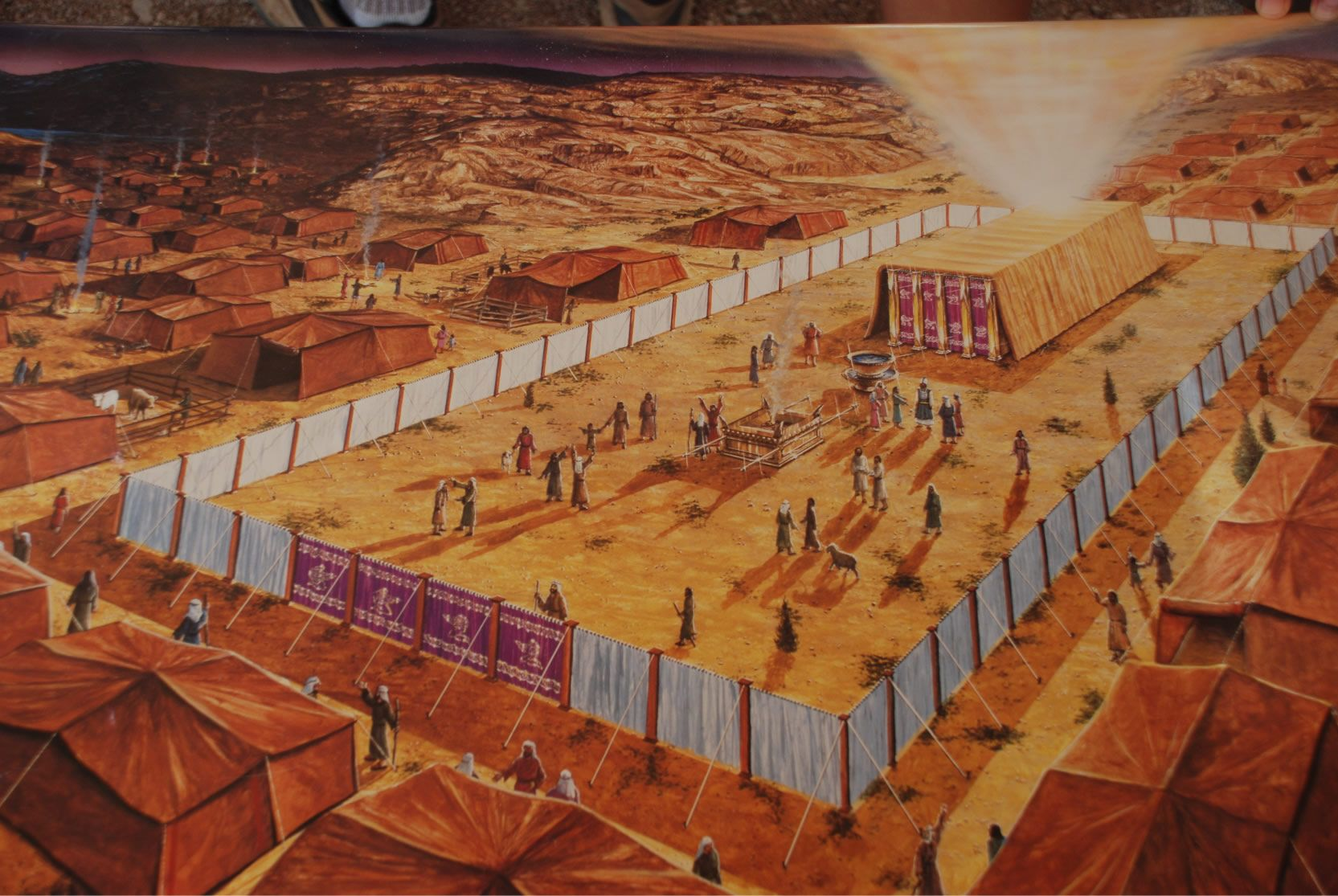
Image credit2
3. Be cleansed of your sins by washing (reading) God’s Word.
The water. Moses then washed Aaron and his sons with water. “Moses said to the congregation, ‘This is the thing which the LORD has commanded to do.’ Then Moses had Aaron and his sons come near and washed them with water.” (Lev. 8:5-6). He would have washed them at the “bronze laver” (Ex. 30:18). Water frequently symbolizes the cleansing of the Holy Spirit (Ez 36:25-27). Bronze symbolizes judgment in the Bible (Rev. 1:15). If one looked down in a bronze laver filled with water, the person could see their reflection. When we read God’s Law it also reflects and shows us our sins (Rom. 3:20). To wash ourselves today, we must read God’s Word: “so that He might sanctify her, having cleansed her by the washing of water with the word . . .” (Eph. 5:26). Once the Holy Spirit makes our sins known to us through the Word, we must confess them: “If we confess our sins, He is faithful and righteous to forgive us our sins and to cleanse us from all unrighteousness.” (1 Jo. 1:9). Moses’ washing of Aaron and his sons foreshadowed Jesus’ washing of the disciples in the Last Supper / Seder. Unless we let Jesus wash us, we cannot be one with Him (Jo. 13:5-10). Are you regularly reading the Word to reveal your sins? Are you confessing the sins of your daily life to have them forgiven? Are you setting a good example in this area for others?
Image credit3
4. Be clothed in God’s righteousness. Lev. 8:7-9.
The clothes. Moses dressed Aaron in a special tunic (a garment), a sash, a robe, and an ephod (an apron). “He put the tunic on him and girded him with the sash, and clothed him with the robe and put the ephod on him; and he girded him with the artistic band of the ephod, with which he tied it to him.” (Lev. 8:7; Ex. 28:4). God provided clothes for the priests through the offerings or tithes of others (Lev. 7:8). He will also provide clothes for you (Matt. 6:30). The garments you wear symbolize the motive for your works. If your works are motivated to honor or promote yourself, your actions look like “filthy garments” to God (Is. 64:6). Likewise, if you boast of your good works, you will have no reward in heaven (Matt. 6:1-2). By contrast, if you do God’s will out of love and devotion to Christ, you “will thus be clothed in white garments . . .” (Rev. 3:5, 18). Moreover, if you do your good works in secret, He will reward you in heaven (Matt. 6:3-4). Do you share all of your good works with others? Are they all on your resume? When you have volunteered or helped others in the past, was the love of Christ your real motive for doing so?
Image credit4
The breast piece. The breast piece had 12 precious stones worn over the priest’s heart. “He then placed the breastpiece on him, and in the breastpiece he put the Urim and the Thummim.” (Lev. 8:8; Ex. 28:15-20). The 12 stones represented the 12 tribes of Israel (Ex. 28:21). For the priest to wear these stones over his heart, it meant that he was not concerned about himself but the nation and all the people. We again are God’s priests. Do you pray only for yourself and immediate family and friends? Are you burdened by the sins of the people around you and the nation? Have you spoken out to defend God’s morality?
Image credit5
Urim and Thummim. The priest was given two holy stones to help him discern God’s will (Lev. 8:8; Ex. 28:30). Today, you are given the Holy Spirit to discern God’s will (Jo. 16:7, 13). Do you search out the Holy Spirit for all your decisions? (Jam. 1:5).
The headpiece. The priest also wore a sacred headpiece. “He also placed the turban on his head, and on the turban, at its front, he placed the golden plate, the holy crown, just as the LORD had commanded Moses.” (Lev. 8:9). “and you shall set the turban on his head and put the holy crown on the turban.” (Ex. 29:6). The headpiece said in gold letters “Holiness to the Lord.” (Ex. 28:36). The priest’s thoughts were to dwell on God and to be holy. As one of God’s priests, do your thoughts dwell on Him and His Word? If your thoughts were summarized in a single slogan for all to see, would it be a holy or a profane slogan?
5. Be led by the Spirit.
The oil. Moses then sprinkled the altar and the serving items seven times with oil. “Moses then took the anointing oil and anointed the tabernacle and all that was in it, and consecrated them. He sprinkled some of it on the altar seven times and anointed the altar and all its utensils, and the basin and its stand, to consecrate them.” (Lev. 8:10-11; Ex. 29:37). Oil symbolizes the Holy Spirit (1 Sam. 16:13). Sprinkling the oil on the altar seven times symbolized completeness. Moses then poured the oil on Aaron’s head to consecrate Him. “Then he poured some of the anointing oil on Aaron's head and anointed him, to consecrate him.” (Lev. 8:12). “Then you shall take the anointing oil and pour it on his head and anoint him.” (Ex. 29:7). When Christ began His ministry, He was dunked into the Jordan river (Matt. 3:13-15). The oil being poured on Aaron’s head symbolized the complete immersion of the Spirit, like a baptism. Believers must be led by the Spirit in all that they do: “For all who are being led by the Spirit of God, these are sons of God.” (Ro. 8:14). Is the Holy Spirit pouring out of your life for all to see?
Image credit6
6. Have faith in Christ’s blood.
The bull’s blood on the horns of the altar. (Lev. 8:13-15). Moses then had Aaron and his sons lay their hands on the bull’s head (one without defect) and sacrificed it as a sin offering. “Next Moses had Aaron's sons come near and clothed them with tunics, and girded them with sashes and bound caps on them, just as the LORD had commanded Moses. Then he brought the bull of the sin offering, and Aaron and his sons laid their hands on the head of the bull of the sin offering.” (Lev. 8:13-15). They all knew the procedures for the sin offering well. Yet, this was a test of faith. Aaron and his sons had to have faith that their sins were vicariously transferred to the bull to be killed. This foreshadowed the transfer of our sins to Jesus (1 Pet. 1:18-19; Mk. 14:14; 2 Cor. 5:21; Is. 53:4-5). Moses then put the blood on the horns of the altar. “Next Moses slaughtered it and took the blood and with his finger put some of it around on the horns of the altar, and purified the altar. Then he poured out the rest of the blood at the base of the altar and consecrated it, to make atonement for it.” (Lev. 8:15). The horns symbolize power (Ps. 18:2; 89:17; Lk. 1:69; Lam. 2:3; 1 Kgs. 1:50; 2:28). By placing the blood on the horns, Moses professed that the power of the blood to forgive sins was great (Heb. 9:22). Today, the power of Christ’s blood is so strong that anyone who believes in it has “no condemnation” for any prior sins (Rom. 8:1). Is any old sin holding you back from serving God as part of His nation of priests? If so, your faith in Christ’s power is weak. Are you refusing to accept that someone else can be forgiven for what he or she did to you or someone else? If so, your Father in Heaven cannot forgive you for your sins (Matt. 6:15).
Image credit7
7. Make your prayers a sweet aroma to God.
The smoke offering. To create a “smoke offering,” Moses took the fat around the inner parts, the liver, and the kidneys and burned them on the altar. “He also took all the fat that was on the entrails and the lobe of the liver, and the two kidneys and their fat; and Moses offered it up in smoke on the altar.” (Lev. 8:16). The hide and the flesh, however, were burned away from God. “But the bull and its hide and its flesh and its refuse he burned in the fire outside the camp, just as the LORD had commanded Moses.” (Lev. 8:17). The smoke from the burnt offering was a “soothing aroma” to God (Lev. 1:9; Ex. 29:18). Christ’s blood was pure and therefore a soothing aroma to God (Eph. 5:2). Today, we can create a “soothing aroma” for God through our prayers: “May my prayer be counted as incense before You . . .” (Ps. 141:2; Rev. 5:8; 8:4). By only using the fat around the organs that keep the body clean to create this smoke, this meant that the priest was to offer up prayers that were holy (Lev. 8:16). By excluding the hide and the flesh from the smoke offering, the prayers were not to dwell on unclean things (Lev. 8:17). Are your prayers filled with righteous petitions to forgive the sins of others and the nation? Or, are they filled with bitter and selfish complaints?
Image credit8
8. Restore those that you have wronged.
The guilt or trespass offering. Moses also had Aaron and his sons place their hand on the head of a ram and then sprinkled its blood on the altar. “Then he presented the ram of the burnt offering, and Aaron and his sons laid their hands on the head of the ram. Moses slaughtered it and sprinkled the blood around on the altar.” (Lev. 8:18-19). The ram first appeared in the Bible as a substitute offering. As a substitute for Isaac, Abraham offered the ram with its head caught in the thicket of thorns. This foreshadowed God’s offering of His only son. He would also die with a crown of thorns: “God will provide for Himself the lamb for the burnt offering.” (Gen. 22:8). The ram later became the animal for the guilt offering to keep a person holy and to pay for restitution for sins against God (Lev. 5:15). Jesus was also our guilt offering to pay for our sins to God (Is. 53:10-11). Yet, God makes clear that we must still restore those around us that we have wronged as part of the guilt / trespass offering (Lev. 6:1-7). Jesus also makes it clear that we must restore those that we have wronged before we come to God with our petitions. “Therefore if you are presenting your offering at the altar, and there remember that your brother has something against you, leave your offering there before the altar and go; first be reconciled to your brother, and then come and present your offering.” (Matt. 5:23-24). Have you paid back and apologized to the people who you have wronged?
9. Keep your motives in serving God pure.
The cutting of the animal and the washing of the inner parts. Moses then cut the ram into pieces and burned. “When he had cut the ram into its pieces, Moses offered up the head and the pieces and the suet in smoke. After he had washed the entrails and the legs with water, Moses offered up the whole ram in smoke on the altar. It was a burnt offering for a soothing aroma; it was an offering by fire to the LORD, just as the LORD had commanded Moses.” (Lev. 8:20-21). No part of our lives is secret from the Lord (Ecc. 12:14). Moses also washed the inner parts of the sacrifice before it was burned (Lev. 8: 21). Our life offering to God cannot include any hidden thing or motive that is impure. If so, the sacrifice is meaningless to Him: “Even though you offer up to Me burnt offerings . . . I will not accept them . . .” (Amos 5:21-24). “Bring your worthless offerings no longer, incense is an abomination to Me.” (Isa. 1:13; Jer. 7:21-24). This includes praising God in all that you do: “Through Him then, let us continually offer up a sacrifice of praise to God, that is, the fruit of lips that give thanks to His name.” (Heb. 13:15). Are you serving God out of routine or ritual? Are your songs filled with heartfelt praise? Or, during the worship, are merely mouthing the words of praise?
10. Let God be the dominant force in your life.
The blood on the right extremities. Moses then sacrificed the second ram, the ram of ordination: “Then he presented the second ram, the ram of ordination, and Aaron and his sons laid their hands on the head of the ram.” (Lev. 8:22). He then slaughtered the second ram and put the blood on Aaron and his son’s: (1) right ear; (2) their right hand thumb; and (3) their right big toe. He then poured the rest at the altar: “Moses slaughtered it and took some of its blood and put it on the lobe of Aaron's right ear, and on the thumb of his right hand and on the big toe of his right foot. He also had Aaron's sons come near; and Moses put some of the blood on the lobe of their right ear, and on the thumb of their right hand and on the big toe of their right foot. Moses then sprinkled the rest of the blood around on the altar.” (Lev. 8:23-24). Most people consider their right hand or foot to be their dominant side. By placing the blood on the right side, it symbolized as part of the ordination that they had become like the ram. They would substitute the will of God for their own will as the dominant force in their lives. In short, God would come first in what they listened to (their ears), where they went (their feet), and what they touched (their hands). Why not the eyes and the mouth? Blood could not go in the mouth or eyes because it was forbidden for it to enter the body (Lev. 7:26-7). Yet, the priests were still signaling that God came first in everything. Does God come first in your life? Or, do you serve only when it is convenient, and when your work, your family, and other activities don’t interfere?
11. Give your best to God and deny yourself for God.
The second fat offering. Moses then offered the fat to God, yet not as a smoke offering. “He took the fat, and the fat tail, and all the fat that was on the entrails, and the lobe of the liver and the two kidneys and their fat and the right thigh.” (Lev. 8:25; 8:16; 7:3; 3:14-15). The fat is a delicacy and the best tasting part of the animal. Yet, when consumed in excess, it can cause health problems. Here, the fat offering singled the priests’ commitment to deny pleasures for themselves. Christ says that those who want to follow Him as His disciples need to “deny” themselves: “Then Jesus said to His disciples, ‘If anyone wishes to come after Me, he must deny himself, and take up his cross and follow Me.”’ (Matt. 16:24). “For whoever wishes to save his life will lose it; but whoever loses his life for My sake will find it.” (Matt. 16:25-26). “So likewise, whoever of you does not forsake all that he has cannot be My disciple.” (Lk. 14:28-33). “He who loves his life will lose it, and he who hates his life in this world will keep it for eternal life. If anyone serves Me, let him follow Me; and where I am, there My servant will be also. If anyone serves Me, him My Father will honor.” (Jo. 12:25-26). We are like a pitcher. If we fill our pitcher up with only selfish desires, there is nothing left for the Spirit to fill up. We then become filled with darkness (Matt. 6:22-23). “Therefore do not let sin reign in your mortal body so that you obey its lusts.” (Rom. 6:12). If we empty the pitcher of selfish desires, we allow God to fill our pitcher with the will of the Spirit (Tit. 2:11-14). Have you denied yourself any pleasures in life for Christ?
12. Keep yourself pure for God.
The kidney and liver offering. The priests also had to sacrifice the kidneys and the liver (Lev. 8:25; 7:4; 3:10). The kidneys and the liver keep the body clean. They filter and remove toxins and waste products from the blood. The blood is the symbol of life (Lev. 17:11). If a priest is giving these things to God, he is giving control to God over the things that make the person pure in life. This would include everything that we decide to read, watch, consume, talk about, or touch. If you fill your eyes with darkness, your entire body becomes filled with darkness (Matt. 6:22-23). Have you kept your eyes pure? Would God approve of what you watch, read, and talk about?
13. Give thanksgiving to God.
The grain offering. Moses also offered a bread cake offering. “From the basket of unleavened bread that was before the LORD, he took one unleavened cake and one cake of bread mixed with oil and one wafer, and placed them on the portions of fat and on the right thigh.” (Lev. 8:26). This offering is a type of grain offering (Lev. 2). The grain offering was given out of thanksgiving (Dt. 29:8-11). In lieu of a grain offering, Paul says that we should offer our bodies as a living sacrifice for God: “Therefore I urge you, brethren, by the mercies of God, to present your bodies a living and holy sacrifice, acceptable to God, which is your spiritual service of worship.” (Ro. 12:1; 1 Cor. 6:19-20; 7:23). Yet, we must serve with praise and thanksgiving. If we are bitter, we are a poor witness to others on what it means to be a Christian. Have you given your body over to God and kept it holy out of gratitude for what Jesus did for you? Are you bitter about anything?
Image credit9
14. Give an offering of yourself without sin and guided by the Holy Spirit.
The absence of leaven and mixed with oil. The bread was to be made without yeast or leaven (Lev. 8:26; 2:4, 11; Ex. 12:15; 29:1-3; Nu. 6:15). Leaven is a symbol of sin (1 Cor. 5:6-8; Gal. 5:9). Today, we are the bride of Christ (Rev. 22:2, 17). The house or temple where the Holy Spirit dwells is in our bodies (1 Cor. 3:16-17). The bread was also prepared with oil, a symbol of the Holy Spirit (Lev. 8:26; 1 Sam. 16:13). Because the Holy Spirit dwells within us, we must remove the leaven from our bodies (1 Cor. 5:7; 6:13-15; 18-20). If you have hidden any sin, it will soon rise like leaven. Are there any hidden sins in your life?
15. Humble yourself and let God be your strength.
The thigh meat offering. The bread offering also had within it the meat from the thigh (Lev. 8:26; same Lev. 7:31-34). The thigh muscle is one of the strongest in the body. We must give up our own strength and pride. Instead, when we empty ourselves, Jesus will become our strength. We can then do all things through Him who strengthens us: “I can do all things through Him who strengthens me.” (Phil. 4:13). Are you relying upon your own strength and understanding to overcome your challenges? When led by the Spirit, accept, in faith, tasks that you cannot do on your own.
16. Let the blood of Christ be visible in your life.
The wave offering with blood on the garments. After presenting a wave offering to God, Moses then sprinkled the blood on the garments of the priests. “He then put all these on the hands of Aaron and on the hands of his sons and presented them as a wave offering before the LORD. He then put all these on the hands of Aaron and on the hands of his sons and presented them as a wave offering before the LORD. Moses also took the breast and presented it for a wave offering before the LORD; it was Moses' portion of the ram of ordination, just as the LORD had commanded Moses. So Moses took some of the anointing oil and some of the blood which was on the altar and sprinkled it on Aaron, on his garments, on his sons, and on the garments of his sons with him; and he consecrated Aaron, his garments, and his sons, and the garments of his sons with him.” (Lev. 8:27-30). The blood would not have been a pretty thing to see. Yet, it reminded the priests just how gross their sins were before God. The blood also served another purpose. The clothes symbolized outward acts (Is. 64:6). The wave offering followed by the blood on the garments symbolized that Christ was visible for all to see in the priest’s life. Is Christ visible in your life for all to see? Or, is your faith hidden?
Wave offering (image credit)10
17. Let the fruit of the Holy Spirit be visible in your life.
The oil on the garments. Moses also sprinkled oil on the garments (Lev. 8:30). The oil again symbolizes the Holy Spirit (1 Sam. 16:13). Our garments also again symbolize our outward acts (Is. 64:6). Jesus says that you will know a person by their fruits (Matt. 7:16-20). Is the fruit of the Spirit clearly visible in all that you do for others to see? (Gal. 5:22-23).
18. Be in fellowship with God.
The meal prepared in God’s presence. Much like the peace offering, the priests were to cook the meat and eat it in front of the door of the Tent of Meeting. “Then Moses said to Aaron and to his sons, ‘Boil the flesh at the doorway of the tent of meeting, and eat it there together with the bread which is in the basket of the ordination offering, just as I commanded, saying, ‘Aaron and his sons shall eat it.’ The remainder of the flesh and of the bread you shall burn in the fire.”’ (Lev. 8:31-2; Ex. 29:32). Jesus offered to “dine” in fellowship with those believers who opened the door of their hearts to Him (Rev. 3:20). Only if we search out Christ can we find the peace that He offers us: “And the peace of God, which surpasses all comprehension, will guard your hearts and your minds in Christ Jesus.” (Phil. 4:7). “Therefore, having been justified by faith, we have peace with God through our Lord Jesus Christ . . ” (Rom. 5:1; Eph. 2:13-15). The things that are not of Him in our life we should let Him burn away (Lev. 8:32). Do you actively seek out His peace and fellowship through a deeper relationship with Him?
19. Be patient and ready to sacrifice in serving God.
The seven days spent at God’s door. The priests were required to spend seven days at the entrance to the Tent of Meeting. “You shall not go outside the doorway of the tent of meeting for seven days, until the day that the period of your ordination is fulfilled; for he will ordain you through seven days.” (Lev. 8:33). This would not have been a comfortable thing to do, especially with the daily sacrifices, the public scrutiny and the blood. We are also expected to make sacrifices in our walk as priests for God (Mk. 8:34). We must also be patient in serving the Lord: “I waited patiently for the Lord . . . :” (Ps. 40:1). Do you grow impatient if your prayers are not answered immediately? Have you made any sacrifices in your service to God?
20. Be obedient to God’s Word.
The vow of obedience to God’s Word. The priests were told to do as God commanded so that they don’t die. “The LORD has commanded to do as has been done this day, to make atonement on your behalf. At the doorway of the tent of meeting, moreover, you shall remain day and night for seven days and keep the charge of the LORD, so that you will not die, for so I have been commanded. Thus Aaron and his sons did all the things which the LORD had commanded through Moses.” (Lev. 8:34-36). In total, the word “command” appears 12 times in this chapter. Jesus says that, if we love Him, we will keep His commandments: “If you love Me, you will keep My commandments.” (Jo. 14:15, 21; 15:10; 1 Jo. 5:3; 2 Jo. 1:6). “[I]f you wish to enter into life, keep the commandments.” (Matt. 19:17). Jesus came to correct people’s motives. Jesus wants you to be motivated by love and not obligation. He therefore summarized the Ten Commandments as something that comes naturally once a person loves the Lord and his or her neighbor (Matt. 22:35-38; Lk. 10:27, quoting Dt. 6:5). Moses told us to live obediently as it is written. Jesus taught us to love obediently as it is written. Whether we keep the Commandments out of love (and not obligation) is also the test regarding whether we “know” Jesus: “By this we know that we have come to know Him, if we keep His commandments.” (1 Jo. 2:3). Some will come to Jesus boasting of their works or compliance with the law. Yet, if their works or their compliance with the law was not motivated by a love for Jesus, He will respond “I never knew you.” (Matt. 7:23). Is there any area in your life where you are disobedient?
21. Let God do the work to prepare you for service.
Let God turn you into a new creation. Aaron and his sons did nothing to actually be transformed into priests. They did not prepare their garments. They did not prepare the sacrifices. They did not bathe themselves. They only needed to be obedient while Moses prepared them. Today, Jesus is our High Priest who prepares us for service (Heb. 8:1; 1 Pet. 2:9; Rev. 5:10). He wants to transform our bodies and our minds (Rom. 12:2). Have you let Christ control the transformation process?
